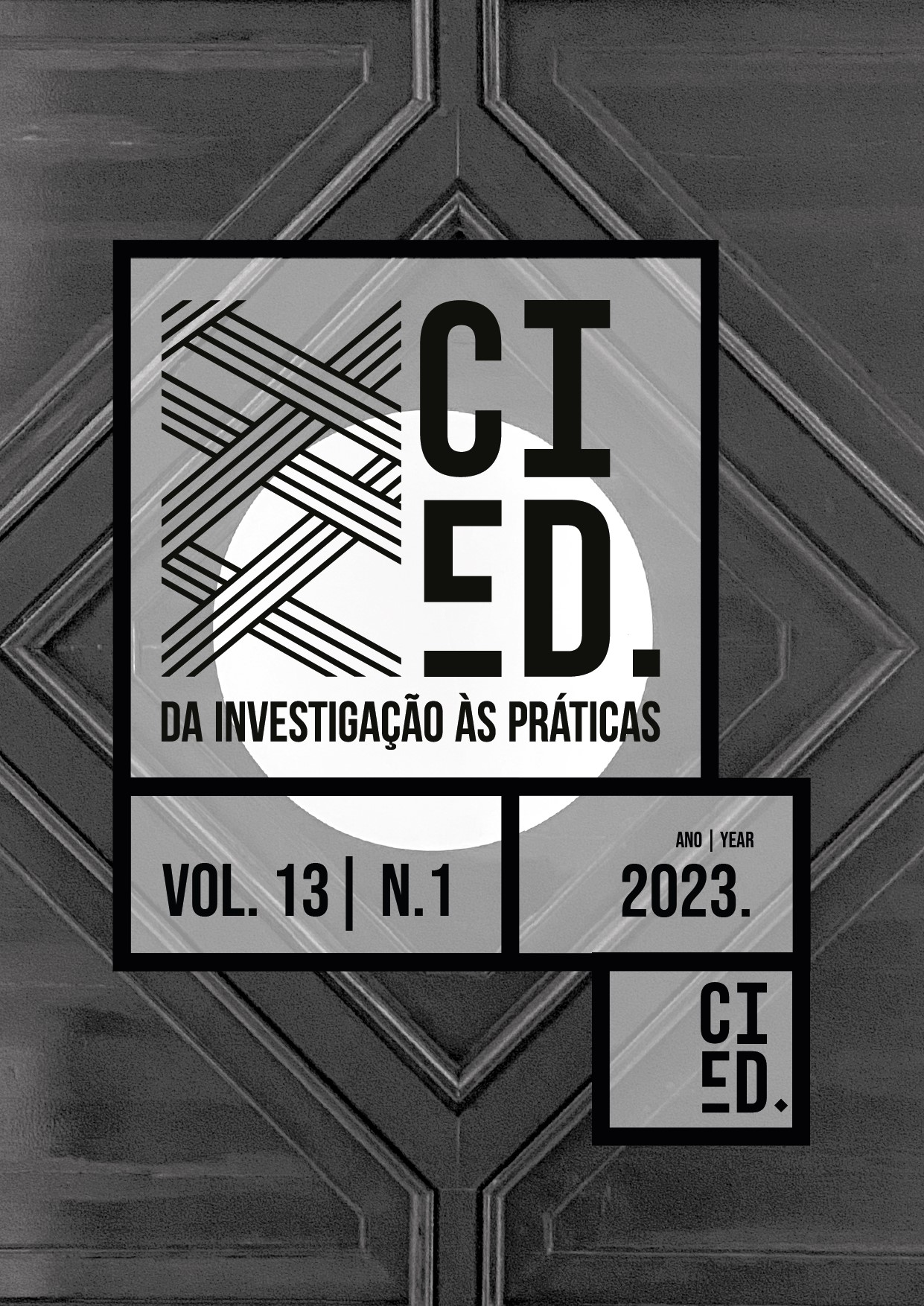The socio-educational relations between Education for Peace and Social Representations of violences by social educators in a favela at Rio de Janeiro – Brazil
DOI:
https://doi.org/10.25757/invep.v13i1.318Keywords:
Social Representations, Violence, Non-school education, Social Pedagogy, Social PsychologyAbstract
This article, derived from a Education’s Research at development at UERJ-FFP, investigates the possible social representations of violence from social educators of a socio-educational project in Complexo do Salgueiro, a favela in the state of Rio de Janeiro, Brazil. Based on field work started in 2021, the research visits the institution from search of the apprehension of social representations of violence shared by educators in this non-school space, dedicating to understanding how these representations end up influencing practices educational programs offered. Therefore, when analyzing socio-educational practices, those indicate whether these may (or not) have served in a real way to undertake an Education for Peace committed to combating violence in this context. The methodology will use as a research instrument the realization of semi-structured interviews and the writing of field diaries. As a result of the work, it is noteworthy that this work is still under development, containing here with reflections and initial hypotheses about its objectives. In the future, we will expand and publicize its empirical and analytical results in the form of new presentations and publications, to contribute to studies on marginalization and violence, as well as with the fields of social representations and Social Pedagogy.
Downloads
References
Aristóteles. (2015). Retórica. Folha de SP.
Brasil. (1996). Lei nº 9394, de 20 de dezembro de 1996. Estabelece as diretrizes e bases da educação nacional. Diário Oficial da República
Federativa do Brasil, Poder Executivo, Brasília-DF.
Brasil. (2006). Resolução CNE/CP nº 1, de 15 de maio de 2006. Institui Diretrizes Curriculares Nacionais para o Curso de Graduação em
Pedagogia. Diário Oficial da República Federativa do Brasil, Poder Executivo, Brasília-DF.
Brasil. (2015). Resolução CNE/CP nº 2, de 1º. de julho de 2015. Define as Diretrizes Curriculares Nacionais para a formação inicial em nível superior (cursos de licenciatura, cursos de formação pedagógica para graduados e cursos de segunda licenciatura) e para a formação continuada. Diário Oficial da República Federativa do Brasil, Poder Executivo, Brasília-DF.
Caliman, G. (2011). Pedagogia Social no Brasil: evolução e perspectivas. Orientamenti Pedagogici, 58, 485-503.
Charlot, B. (2014). Da relação com o saber às práticas educativas. Cortez.
Depraz, N. (2011). Compreender Husserl. Vozes.
Doise, W. Da Psicologia Social à Psicologia Societal. Psicologia: Teoria e pesquisa, 18 (1), 27-35.
Duarte, R. (2004). Entrevistas em pesquisas qualitativas. Educar em Revista, 24, 213-225, 2004.
Ferreira, A. V. (2017). As relações entre a Pedagogia Social, o ensino formal e os aglomerados subnormais na região metropolitana do Rio de Janeiro. Encontrão da Educação Social 2017 - Anais do Congresso Internacional de Pesquisadores e Profissionais da Educação Social, Maringá.
Ferreira, A. V. (2012). Representações Sociais e Identidade Profissional: práticas educativas com camadas empobrecidas. Letra Capital Editora.
Freire, P. (2000). Pedagogia da indignação: cartas pedagógicas e outros escritos. Editora UNESP.
Gadotti, M. & Freire, P. & Guimarães, S. (1995). Pedagogia: diálogo e conflito. Cortez.
Galtung, J. (1969). Violence, Peace and Peace Research. Journal of Peace Research, 6 (3), 167-191.
Galtung, J. (2016). La violencia: cultural, estructural y directa. Cuadernos de estratégia. 183, 147-168.
Han, B. (2017a). Sociedade do Cansaço. Vozes.
Han, B. (2017b). Topologia da Violência. Vozes.
Husserl, E. (1975). Investigações Lógicas. Sexta Investigação. Abril.
Jares, X. R. (2002). Educação para a Paz: sua teoria e prática. Artmed.
Jares, X. R. (2007). Educar para a paz em tempos difíceis. Palas Athena.
Jares, X. R. (2008). Pedagogia da Convivência. Palas Athena.
Jodelet, D. (2001). Representações sociais: um domínio em expansão. In Jodelet, D. (Org.). As representações sociais. EdUERJ.
Manzini, E. J. (2012). Uso da entrevista em dissertações e teses produzidas em um programa de pós-graduação em educação. Revista Percurso - NEMO Maringá, 4 (2), 149-171.
Mazzotti, T. B. (2003). Metáfora: figura argumentativa central na coordenação discursiva das representações sociais. In Campos, P. H. F. & Loureiro, M. C. da S. (Orgs.). Representações Sociais e Práticas Educativas. Ed. UCG.
Misse, M. (2016). Violência e Teoria Social. Dilemas: Revista de Estudos de Conflito e Controle Social, 9 (1), 45-63, 2016.
Moscovici, S. (2003). Representações Sociais - Investigações em Psicologia Social. Vozes.
Moscovici, S. (1978). A psicanálise, sua imagem e seu público. Rio de Janeiro: Zahar, 1978.
Pieroni, V. & Fermino, A. & Caliman, G. (2014). Pedagogia da Alteridade: para viajar a Cosmópolis. Liber Livro.
Reboul, O. (2004). Introdução à retórica. Martins Fontes.
Spink, M. J. (1995). O estudo empírico das representações sociais. In: Spink, M. J. (Org.). O conhecimento no cotidiano: as representações sociais nas perspectivas da psicologia social. Brasiliense.
Downloads
Published
How to Cite
Issue
Section
License
Copyright (c) 2023 Lucas Salgueiro Lopes, Arthur Vianna Ferreira

This work is licensed under a Creative Commons Attribution 4.0 International License.
Articles published or submitted to Da Investigação às Práticas are licensed according to Creative Commons Attribution License (CC BY 4.0). Authors agree that:
Copyrights of all articles published are retained by authors with first publication copyright granted to the journal.
All articles are under the Creative Commons Attribution License recognizing the authorship of the publication and identifying that first publication took place in this journal.
Authors have the right to free distribute or make available in private or institutional pages the version published by Da Investigação às Práticas: Estudos de Natureza Educacional provided the original proper citation.
The journal only accepts articles not published previously (except in the form of an abstract or as part of academic thesis), that it is not under consideration for publication elsewhere. After published, the article cannot be published again partial or totally without the editorial board consent.





 e-ISSN: 2182-1372
e-ISSN: 2182-1372